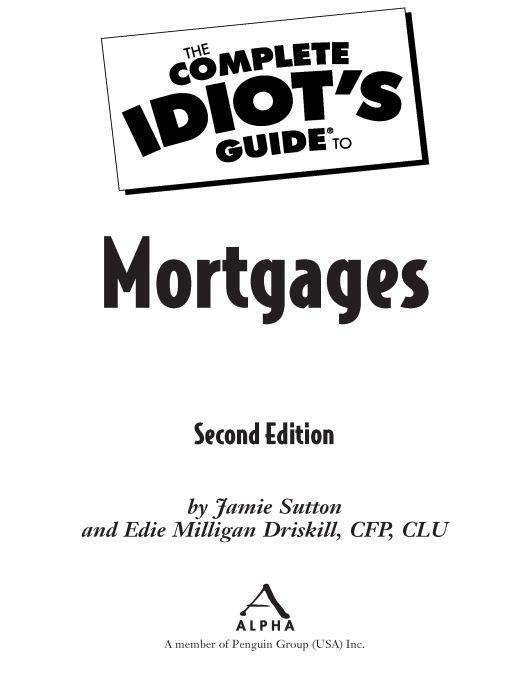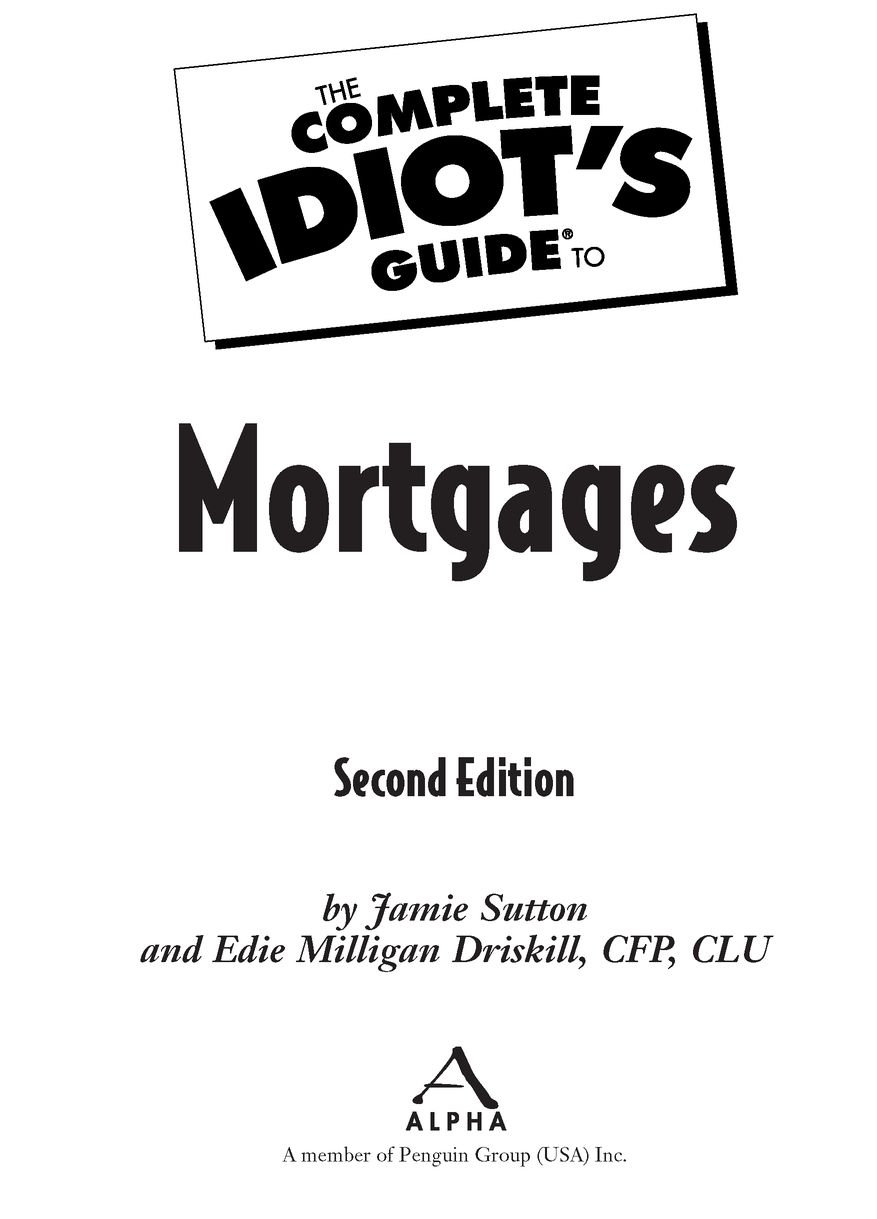Table of Contents
Introduction
Buying a home is exciting because a home is more than just a house or condo that you live in. Its not just a roof over your head. Its a symbol of success and stability. When you buy a home, you have, in a sense, graduated financially. Youve accumulated savings that you will convert into another type of asset. Youve withstood the scrutiny of a lender and passed his or her tests on income and credit. You have shown others and yourself that you are worthy of purchasing your home, which over time may store a significant chunk of your financial net worth.
Because your home plays such an important part in your life, its worth taking the time to educate yourself on how to make its purchase a good financial decision as well as the wonderful, emotionally charged achievement that it is.
As you read through this book, our hope is that weve anticipated most of your questions and offered solutions that help you to become more confident in the loan process. The word process means an ongoing action. Not everyone who reads this book will be ready to purchase and finance a home tomorrow. You can be assured, though, that with a little advance planning, any circumstance that presently stands in your way can be easily overcome. And the resulting home purchase will be a better, more pleasant experience for your advance efforts.
Throughout this book weve scattered sidebars to elaborate on concepts introduced in the text. Heres what to expect in each:
definition
Every industry has its own buzz words and acronyms, and the lending business is no exception. In this sidebar youll find definitions and explanations for every unfamiliar term you come across.
Its Your Money
Here youll find helpful tips for handling your own personal financial mattersregardless of whether you buy a homeas well as further insight into how things are done in the lending industry (and why).
Before You Sign
If it sounds too good to be true, it probably is. And if everyone who took out a mortgage read the cautions in these boxes before signing on the dotted line, there would be a lot fewer bankruptcies and foreclosures.
Acknowledgments
I greatly appreciate the patience of my familymy husband, Jerry, and my children, Audrey and Ericas I worked on this book. Their tolerance of my absences and blurry-eyed responses (from burning the midnight oil) allowed me to push myself to complete this project in a timely fashion.
Thanks to Mike Sanders and his team at Alpha Books for guiding me through the magical process of publishing for a second time.
Several colleagues were invaluable as pieces of the book came together. Thank you to Don DeMattio for his thoughts, wisdom, and insight. Thank you to Bob Brown; I truly appreciate his commonsense approach to life in general. Id like to thank Russell Smith for his willingness to jump in when I needed four hands, Jeff Shaw for his research, and my friends Brian Kemp and Brian Lehner for their Realtor wisdom and constant encouragement. Thank you to John Washington, who continues to teach us all the difference between subprime and predatory. Thank you to Jan Jedlinsky and Cindy Henretta for helping me get my worksheets and exhibits together. Thanks to Eric Westerhausen and Mike Mossyou are truly amazing resources. And a special thanks to Meagan Young and First American Credco for their credit report training guide.
Trademarks
All terms mentioned in this book that are known to be or are suspected of being trademarks or service marks have been appropriately capitalized. Alpha Books and Penguin Group (USA) Inc. cannot attest to the accuracy of this information. Use of a term in this book should not be regarded as affecting the validity of any trademark or service mark.
Chapter 1
Before You Start Looking at Homes
In This ChapterFiguring out what you can afford
Understanding the difference between affording and qualifying
Budgeting for expenses
Theres something magical about owning your own home. The security, sense of stability, and connection to community that come from being a homeowner are priceless to some. Unfortunately, this quest for intangible benefits leaves some home shoppers ignoring the financial realities of homeownership.
So before you look at even one house, you have some thinking and calculating to do. Only then can you set out on the most exciting shopping trip of your life, with the confidence that you are making the right decisions based on the best information.
If you find your dream home first, fall in love with the neighborhood, and start redecorating it in your mind, you might allow yourself to feel pressured by mortgage companies to accept terms and jump through unnecessary hoops. Keep yourself in the drivers seat by resolving all the purely business decisions before you cross over into the dream state of home shopping.
How Much Home Can You Afford?
As you begin to consider purchasing a home, you must first answer a very important question: how much home can you afford? The final answer to this question involves some careful thought and planning. The sale price, loan type, and amount of money you can put toward the purchase all play a role in the final purchase amount, so lets start with how to choose a price range of homes to look for.
There are two (sometimes very different) answers to the How much home can I afford? question. The lending institution you choose (see Chapter 2) will calculate an amount, and you will have to determine a number you are comfortable with based on your lifestyle. Both avenues must be explored before coming up with the final answer.
Determining a Price Range
Lending institutions base their answer to the How much can you afford? question on guidelines they have established over the years. When a lender qualifies you for a loan, that lender tells you the maximum amount they will lend to you, based upon your credit rating, income, and assets. But just because a lender qualifies you for a certain mortgage amount doesnt mean that you can afford to take on that much debt. After all, the lender isnt the one responsible for paying your monthly obligationsyou are.
And your lenders maximum may be totally different than what you are comfortable with. For example, just because you and your spouse can currently afford a $200,000 home doesnt mean that you should buy a $200,000 home. Maybe youre going to start a family, perhaps one of you wants to change careers, or maybe one of your parents will need full-time nursing care. You cant predict the future, but you can try to keep yourself within a comfort zone for monthly mortgage payments so you arent living house poor.
definition
House poor means you bought more house than you really should have. You end up putting all of your money into the housewhether fixing it up or furnishing itand you dont have money to do other things that you would also enjoy, such as vacations, dinners out, or shopping.









